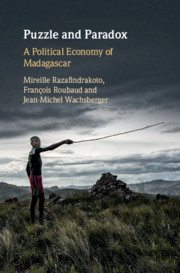Book contents
- Puzzle and Paradox
- Puzzle and Paradox
- Copyright page
- Contents
- Contents
- Tables
- Boxes
- Foreword
- Acknowledgements
- Abbreviations and Acronyms
- General Introduction
- 1 The Malagasy Mystery through the Lens of Economic Growth and Development Theories
- 2 Milestones for a Political Economy of Madagascar’s Trajectory
- 3 Structural Assets
- 4 Obstacles
- 5 Elites in Madagascar: A Sociography
- General Conclusion
- Timeline
- Glossary of Malagasy Terms
- References
- Index
4 - Obstacles
Published online by Cambridge University Press: 12 February 2020
- Puzzle and Paradox
- Puzzle and Paradox
- Copyright page
- Contents
- Contents
- Tables
- Boxes
- Foreword
- Acknowledgements
- Abbreviations and Acronyms
- General Introduction
- 1 The Malagasy Mystery through the Lens of Economic Growth and Development Theories
- 2 Milestones for a Political Economy of Madagascar’s Trajectory
- 3 Structural Assets
- 4 Obstacles
- 5 Elites in Madagascar: A Sociography
- General Conclusion
- Timeline
- Glossary of Malagasy Terms
- References
- Index
Summary
Malagasy society is historically highly hierarchical, endlessly differentiating and ranking individuals in keeping with a hereditary inegalitarian order that has lost none of its symbolism over time. Social inertia is further reinforced by weak formal and informal intermediary bodies, a missing vertical link between president and the population. This phenomenon is accentuated by the subsistence of a traditional political theology that instils the state with a providential quality and attaches Raiamandreny status (duly respected father and mother of their subjects) to those who embody it. The upshot of these elements is a yawning divide between the elites and the people.Social fragmentation is also a factor in the chronic political instability. Madagascar features a lack of stable, long-term coalitions of elites. The scant attention paid the populations and the fragility of the clientelistic connections do not afford broad-based popular support for the men in power.External factors form one last explanatory element for the long-term political instability. The consequences of the donors’ ongoing operational actions, which effectively weakened the state from the early 1980s to the 2000s, were disastrous. This pressure, combined with the people’s poor capacity to demand accountability, brought on the gradual institutional decay and loss of legitimacy.
Keywords
- Type
- Chapter
- Information
- Puzzle and ParadoxA Political Economy of Madagascar, pp. 150 - 191Publisher: Cambridge University PressPrint publication year: 2020



